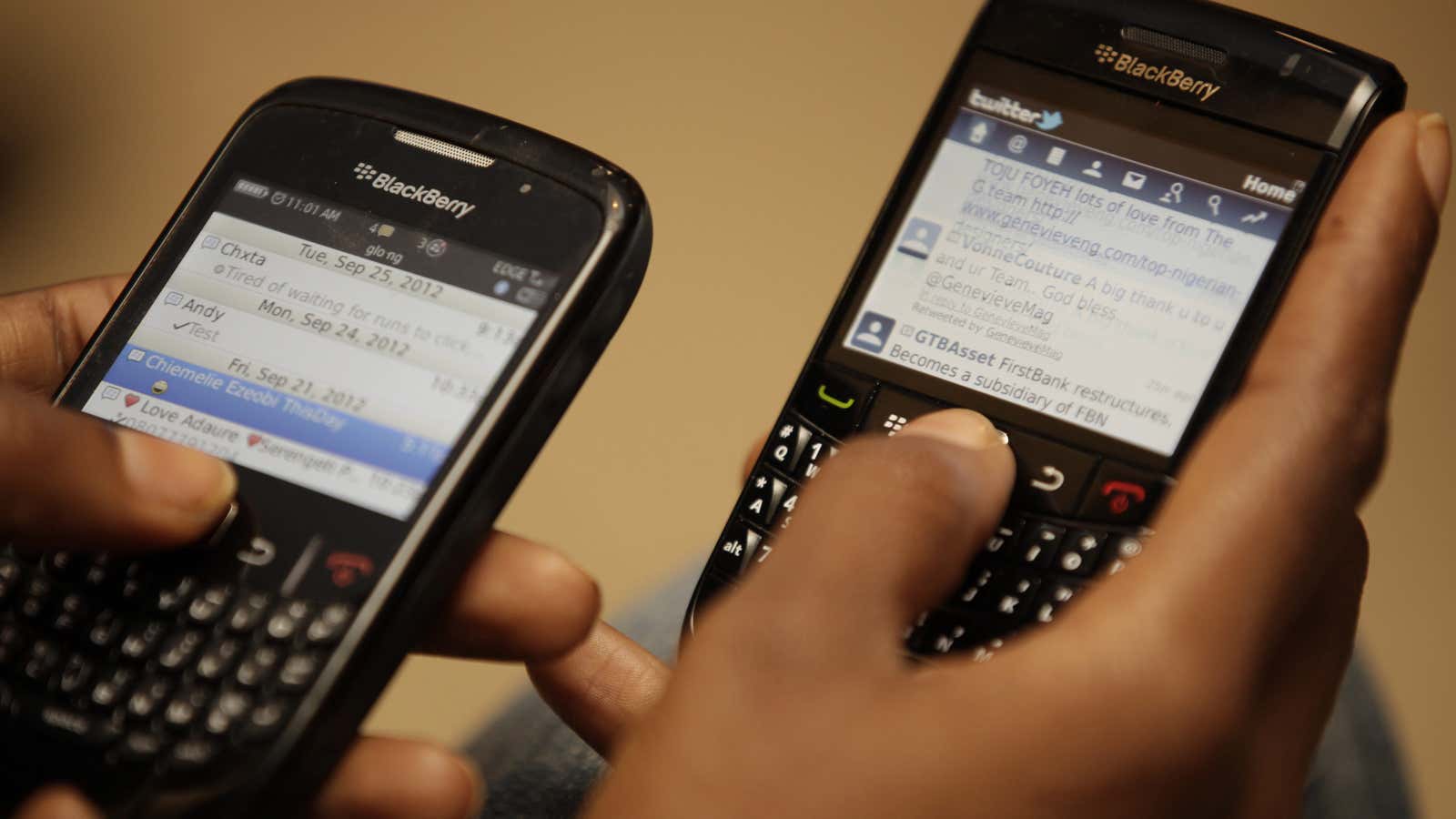Africa may well be the world’s premier mobile-first continent, but vast swathes of the population still don’t have mobile or internet connectivity. This is a severe limitation as local mobile networks plan out building a customer base, especially when the spending power of that base is low.
Yet these challenges place huge opportunities in the hands of the continent’s operators. Voice and SMS “still account for the largest share of revenues and have showed resilience to the threat of IP-based services, mostly due to low smartphone adoption,” says telecoms industry body GSMA’s 2016 Africa report (pdf).
The situation is changing as smartphone adoption jumps and access to mobile broadband networks rises. It means apps such as WhatsApp, Viber and Skype, along with local alternatives in some countries, feature more prominently as consumers switch to these services to save money.
But this puts pressure on the usually reliable cash cows of voice and SMS to sustain revenue growth. This is why African mobile operators need to innovate if they want to maintain healthy profit margins. But this isn’t as easy as it might sound, African telcos have seen their margins squeezed over the last five years from over 40% to around 33% last year, according to GSMA. Unsurprisingly, large incumbent phone companies struggle with innovation just like their large counterparts in other industries. Their internal mechanics are too cumbersome, too top-heavy, and too tied to tight key performance indicators (KPI).
The launch of the renowned mobile money service M-Pesa by Kenyan network operator Safaricom, a few years back is often cited as a best example that Africa’s mobile operators are innovators. Yet, cast an eye around and until recently there had been few other examples of groundbreaking innovation elsewhere in the African telecoms sector. More common have been costly price wars, and following the crowd. What did Airtel and Orange do in response to M-Pesa? They launched their own, Airtel Money and Orange Money.
Preparing to pipe
It took African mobile operators a long time to realize the kind of innovation that could set them apart from their counterparts was not going to spring from in-house. Across the tech conference circuit over the last few years there have been regular complaints from OTT providers like WeChat and Mxit that operators have not realized their role is to be “pipes” for services, rather than providing the services themselves. The operators did not want to be “dumb pipes”.
That, thankfully, is something that has changed. Africa’s mobile operators have accepted they are pipes, if not “dumb” ones. The continuing inaccessibility of rural populations, the slow growth of Africa’s middle class, and the failure for any truly impactful innovation to spring from within a telecom since M-Pesa led to this. Innovation is now happening at a great pace.
Operators reacted by seeking out innovative companies that can provide the quality services that will help differentiate, say, Safaricom from Airtel, while allowing the operator to do what it does best: provide quality, reliable connectivity. Africa’s mobile operators have increasingly come to see they must innovate to prosper, and that this innovation lies outside company doors.
Safaricom launched a US$1 million investment fund, and invested in e-courier service Sendy. It has also partnered local Kenyan startups Dynamic Data Systems and Eneza Education to roll out services for its customers on top of its network. Other operators haven’t been left behind. Orange has backed two African companies, while Airtel has signed partnerships with as Ghanaian fintech startup Zeepay, Nigerian matchmaking service MatchUP, and delivery app Yuzah.
Diversifying business models
The crux of all of this is that Africa’s mobile operators are gradually moving towards supporting the continent’s tech startup ecosystem to provide them with access to the innovations that will help them compete on services, rather than price, for customers in the coming years. The likes of MTN and Tigo have gone deeper still, launching accelerators and backing tech hubs to really get in on the ground floor.
We may be about to see the role of the African operator shift still further. In Kenya, Safaricom is working on diversifying its business, via the unlikely route of going head-to-head with taxi app Uber. Its own taxi app—Little Cabs— has just gone live, signaling a change in direction for the country’s leading operator.
While entering into competition with a global titan like Uber may not make much sense, the diversification of business models does. With so much competition on the ground for such a small market, it makes sense for a company like Safaricom to look at other ways of using its marketing and tech muscle to make money. Safaricom chief executive Bob Collymore says Kenyans can expect more such services from Safaricom. Expect to see similar diversifications across the board.
*Additional reporting by Abdi Latif Dahir.
